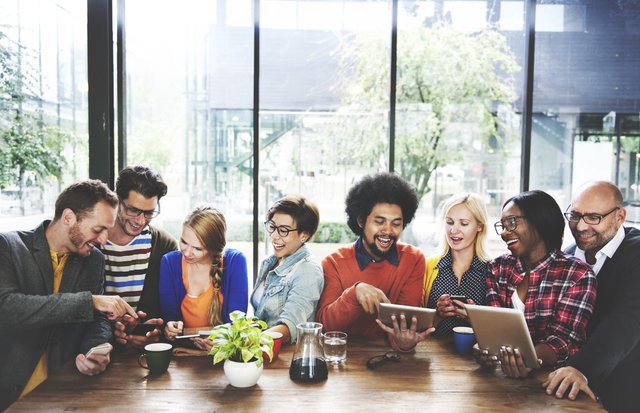3 Important Blockchain Uses That Go Far Beyond Cryptocurrencies and Coins
I’ve been passionate about blockchain and cryptocurrencies for over 5 years.
It’s one of those things I can’t help but talk about wherever I am — out to dinner, at a conference, running into friends. But every time I bring it up, people always ask me, “What does it actually do?”
The truth is, the average person doesn’t know the difference between blockchain, Bitcoin, and cryptocurrencies And the confusion isn’t surprising— it takes time for people to understand new technology. Lack of education is one of the greatest barriers to mass adoption.
Even though Bitcoin was all over the news this year, what we really should be talking about is the blockchain technology behind it.
The technology is going to change everything, not just finance. Blockchain’s distributed ledger will revolutionize how we encrypt (or sell) our data, how records are kept, and bring some much needed confidence to peer-to-peer transactions — all with an unprecedented level of safety and accountability.
But it doesn’t stop there. Blockchain will allow us to create more efficient systems when interacting with each other, across the board. To really understand the massive shifts that will touch every aspect of our lives, let me tell you some of the social, political, and economic changes that are in the pipeline — and that I’m super excited about.
Here are 3 important blockchain uses that go far beyond cryptocurrencies and coins:
- With blockchain technology, you can entirely control your social footprint.
The truth is, we don’t currently recognize the value of our own data.
For example, most of us use Facebook every single day, but fail to realize that the ads we’re seeing are earning money for the social media giant — and that we, the users, are the “product” they’re selling. Who we talk to, what we search for, and which photos we like are all data points with real monetary value. And Facebook (along with most other social media platforms) aren’t currently incentivized to change this way of operating. There’s just too much money on the table.
But it’s your data. You should be the one to choose how it’s used. And blockchain has the potential to decentralize social media, giving users true ownership of our data.
Because whether you choose to keep your information private or sell it to marketers, either way, you’re in control. I could even envision a shared revenue model with existing social media platforms. What if, in return for monetizing your data, Facebook would give you a token to use on Amazon, for example. Now that would be an interesting model.
But these kinds of social possibilities are just some of the many exciting use cases of blockchain.
- You can finally hold your government accountable.
Imagine if you never had to deal with long lines to vote, bureaucratic red tape, and all the paperwork ingrained in these antiquated institutions.
Because blockchain creates a permanent public record, it can streamline processes and eliminate tampering in government. This drastically improves voting — and every country can benefit from election results that have been audited and verified. It can also lower the amount of bureaucracy required, as political engagement, integration, and trust increase.
On the blockchain, no one — including dictators, terrorists, or politicians — can change the recorded history of a country. This very use case could cast out corruption and actually turn truth into a commodity.
Distributed ledger technology will bolster the security of all records across the board, from land registries to titles and real estate deeds, to name a few. This immutable ledger will spell out ownership and history in a clearer, more trustworthy way.
When we incorporate the blockchain into our world the possibilities are manifold: No more opacity when dealing with bureaucracy, no more selective omissions for politicians and interest groups. We will be able to verify and validate everything the government does — finally holding them accountable.
There’s a reason why people are so bullish on the future of blockchain and the implications it will have socially.
- You can have total economic and financial control.
I predict we’ll soon see banks take a more streamlined approach with customers: decreasing fees, personalizing services, and making the whole process more accessible and efficient.
For example, old guard institutions are already stepping in to explore how they can use blockchain to keep up. Banks are looking at using algorithms to offer more personalization to customers — mobilizing data to drive innovation and build trust from a behavioral standpoint. This all helps integrated banking
stay relevant, because the truth is, the blockchain space is barrelling toward a decentralized future.
Although this won’t happen anytime soon, the decentralized economy we’re working towards is a place where the average person doesn’t need a bank. All they’d need to participate in the economy is their digital identity, directly tied to the types and amounts of currencies they use. For the first time ever, you wouldn’t need permission to send funds, or permission to withdraw money from an ATM. Both “parties” would trust each other, because they’d have an immutable ledger documenting everything.
This is why blockchain’s potential is not limited to cryptocurrency, investing, or profiteering. Distributed ledger technology will touch all facets of society, turning trust itself into a commodity and altering how everyone transmits and receives data.
This is just small sampling of the advancements I’m excited about with blockchain’s applications in the social sphere. Realistically, the biggest innovations will probably come once we’ve already adopted blockchain technologies — in ways that would be difficult to imagine at this point in time.

Go here https://steemit.com/@a-a-a to get your post resteemed to over 72,000 followers.